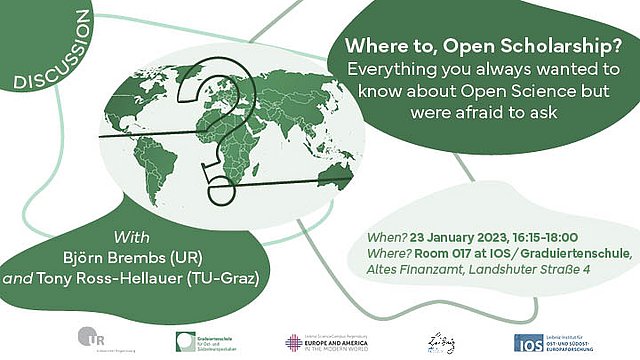You are here:

Where to, Open Scholarship?
in Discussion with Björn Brembs (Regensburg) and Tony Ross-Hellauer (Graz)
- Beginning:
- Monday, 23 January 2023 16:15
- End:
- 18:00
In an open and interactive forum, two experts on Open Scholarship will outline recent developments and future perspectives in the field. They will offer guidance on how ongoing and emerging projects – from individual funding to large-scale collaborative research – can engage with Open Science, both in terms of positioning Open Access publications and ensuring research data meet the FAIR criteria: being Findable, Accessible, Interoperable and Re-usable. At the same time, Björn Brembs (UR) and Tony Ross-Hellauer (TU Graz) will encourage critical reflections on the frameworks of Open Science, which are – as the DFG recently noted – treated by some as a “panacea and an ideology” (DFG, 2022).
Are the growing requirements for Open Scholarship being imposed by funding logics and by norms associated with the STEM subjects? Or are there perhaps opportunities for the humanities, social sciences and area studies by becoming more open? And what can Open Science gain in terms of epistemic diversity from more interaction with these fields, particularly when it comes to questions of research ethics, accessibility of data based on human interactions, reproducibility, and peer review?
Key policy documents have considered the epistemic asymmetries and infrastructural inequalities that Open Science also needs to address. UNESCO, for example, encourages “North-South, North-South-South and South-South collaborations” with respect to Open Science platforms and infrastructure (UNESCO, 2021). The discussion will thus consider what good practices European institutions could learn from the Global South and low- and middle-income countries, something that is particularly relevant to area studies endeavours that seek to work with and not simply onworld regions.
Björn Brembs is professor of Neurogenetics in the Faculty of Biology at the University of Regensburg. As well as being a leading expert in his fields, with a PhD from Würzburg and a highly prestigious funding record, including a DFG Emmy-Noether fellowship and a DFG Heisenberg fellowship, he is also a vocal figure in debates on Open Science in Germany and beyond. In his scholarly publications, the press and his blog, he offers critical insights on academic publishing and data transparency.
Tony Ross-Hellauer is leader of the Open and Reproducible Research Group (ORRG) at Graz University of Technology and Senior Researcher at Know-Center. His research focuses on a range of issues related to open science evaluation, skills, policy, governance, monitoring and infrastructure. Tony has a PhD in Information Studies (University of Glasgow, 2012). He was Project Coordinator (PI) of the Horizon 2020 project ON-MERRIT, researching issues of equity in Open Science and will lead the upcoming Horizon Europe-funded project TIER2, researching issues of epistemic diversity in interventions and debates regarding reproducibility.
Venue:
Room 017, Altes Finanzamt, Landshuter Str.4, 93047 Regensburg
Organised by GS OSESUR and Leibniz ScienceCampus Europe and America in the Modern World
This event is open to anyone interested in these issues, from students through doctoral researchers to professors and administrators. The discussion will be in English, but questions are welcome in German.
back
